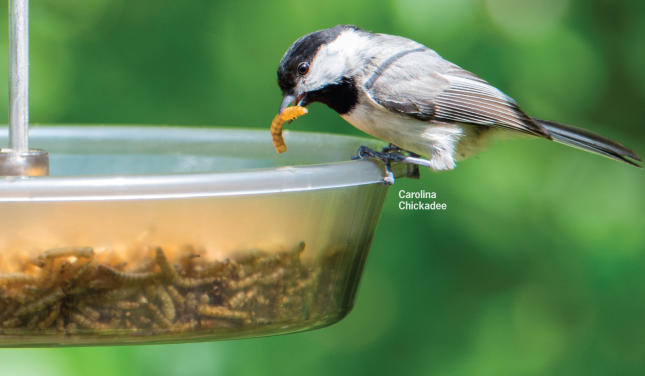
Are Dried Mealworms Safe to Feed Birds?
Regrettably, a recent blog post about mealworms has had widespread social media distribution and unfortunately, contains many errors. It claims that mealworms, particularly dried mealworms, are deadly for birds. The claim is that the dried mealworms become compacted in the stomach and cause a bird’s death through compaction and dehydration.
Here are the facts:
- Be assured that this blog post has received substantial push-back from the larger community of professional wildlife rehabbers across the country due to its misinformation and inaccurate statements. Due to this negative response, the author has voluntarily removed the blog from their website.
- There is no new information or allegations in this blog post that stand the test of scrutiny and it does not provide any factual reason to believe that mealworms are not safe to feed our backyard birds.
False Claim: Dried mealworms’ exoskeletons become compacted in birds’ stomachs and cause death through compaction and dehydration.
- This assumption is biologically incorrect and would be highly implausible in wild birds.
- In a bird’s digestive system, any indigestible material is retained in a portion of the stomach which compacts it into a pellet. Eventually, this pellet is forcibly regurgitated or cast out. It does not pass into the lower digestive tract to create blockages or other issues.
- What the blog referred to as a diagnosis of “compaction” is simply undigested material being formed into a pellet by the stomach before regurgitation. This is normal and not the sign of a bird in distress or discomfort.
- In the wild, there are many insects that have harder, more indigestible parts than mealworms, such as the carapaces of many adult beetles or the wings of many insects. Wild song birds simply eliminate these indigestible material by casting pellets.
- Unfortunately, the blog included a photo alleged to be of fecal matter as proof that a sparrow had this supposed compaction problem. In reality, the image was not of actual fecal material, but pellets of indigestible matter that had been regurgitated.
False Claim: Mealworms must be rehydrated before being consumed to avoid dehydrating song birds.
- This idea simply is not true. Any rehydration necessary will happen internally and the birds will not become dehydrated in the process. Many birds consume an exclusive diet of dry seeds without a problem, so there is no reason to believe that dried mealworms cannot be equally well handled by a song bird’s digestive system.
False Claim: Mealworms should never be fed to breeding birds because it will kill nestlings as parent birds would overfeed them to their youngsters.
- In reality, it would be virtually impossible for adults to overfeed them. Chickadees have been documented to provide 6-9,000 caterpillars to their nestlings before they fledge. House Wrens have been documented to make 500 trips to the nest with food in just one day of feeding. At that rate of consumption, overfeeding mealworms is simply inconceivable.

